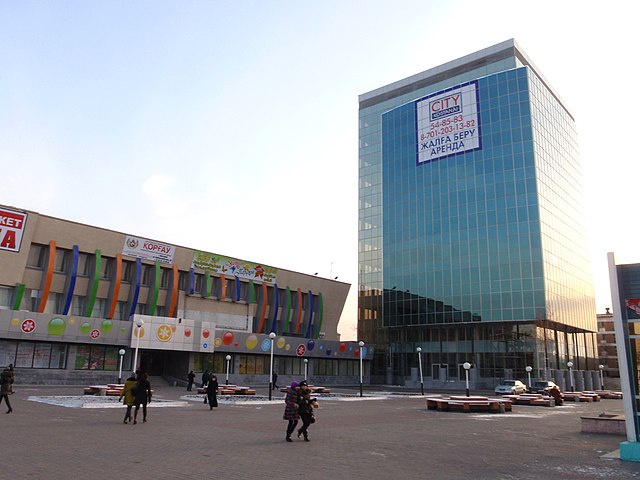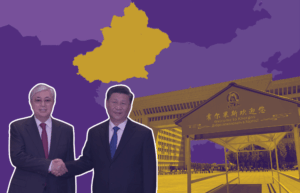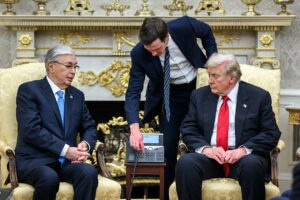The border region of Kostanay has turned into a sanctuary for Russians wanting to flee mobilisation. The journalist Almas Qaısar traveled for Vlast to Kostanay to speak with Russian refugees and local residents about what’s happened in the city. We have translated the article with permission from the editors.
The closer you go to the city centre of Kostanay – where all the administrative buildings, shopping centres, restaurants, and public offices are found – the more people with suitcases and travel packs appear on the horizon. Aside from their conspicuous clothing and their neatly trimmed hair and beards, the Russians are distinguishable by their confused faces. They congregate mostly around three places in the city centre: a shopping centre, a service centre, and a McDonald’s. Even though they’ve already made it across the border, they continue to discuss the situation at the border checkpoint. Russians sit at a table in McDonald’s. Across from them is a group of ethnic Kyrgyz who arrived with them. “A Kalmyk acquaintance of mine was turned back at the border! And that coming from a Kazakh border agent,” says one young Russian in astonishment. He just received access to the Internet. “He must have tried to cross the border at the wrong place. That or he had his papers messed up,” responds his conversation partner while eating a burger. “I’ll find out in a minute,” he says. Over the next half hour, he chats with his acquaintance over the phone to find out the details of the situation. Each of those who made it to Kostanay has a dozen acquaintances trying to cross the border.
Dostonbek
“We decided to flee from mobilisation and not to wait to be shipped off,” says Dostonbek (all names in this article have been changed), who originally comes from Kyrgystan. “I received Russian citizenship eight years ago. I worked there for more than 15 years in a shopping centre. My family stayed there.” He explains that they originally wanted to fly from Moscow, but the tickets sold out quickly and the prices were very high. Now he is on his way to Bishkek. “But it is difficult to live there, the salaries are low, credit is unimaginable. Granted, we’re spending a lot of money here. That guy over there – he planned his wedding in 13 days,” he says, pointing to a younger man. “He invited 300 people! So much money will be wasted,” Dostonbek laughs.
Stepan
An increasing number of Russians gather in McDonald’s. Some have occupied the seats along the wall to charge their devices and try to work on their laptops. Others attempt to relax. Outside it is cold and dreary: Kostanay has become cold and a frosty wind is blowing. “I am 32 years old and I wasn’t affected by the first wave of mobilisation. They are taking everyone arbitrarily. Why am I here? We started a criminal war which I don’t want to take part in. I am against this war. I don’t want to kill any people. That’s not the reason I studied, built my house, and raised my children,” says Stepan. He was born in Kazan. Earlier he worked as a software developer at an IT company. As mobilisation was announced, his family stood by in shock. “No one knew what to do. Many initially thought that it would pass us by. But there was less and less time to think about it. Four days after mobilisation was announced we decided to flee. We were afraid that we wouldn’t make it out in time. People were already being turned away at the border,” he adds. He and his family set off in their car and waited 18 hours at a border checkpoint. They had the possibility to drive through Orenburg but people stood there “for three days without water or food.” They planned to drive through Georgia, but a military recruitment point had already been set up. Read more on Novastan: Kazakhstan’s gradual divorce from Russia“There are people in their 50s and 60s. There are cars full of six young people. Three of them were turned back at border control. There are families with small children and babies. We don’t know why they send people back. Yesterday at the border someone who was recruited, who had served in the army, was let through. But one man who was categorized as disabled, who had never served, and who had no military experience, they didn’t let through,” explains Stepan. He says he made it through Kazakh border security in two hours. “There were no difficulties with them. They laugh and joke.” Out of the 20 people in his division, 16 have already left Russia. Out of 10 close friends, seven have fled. The rest hope not to be recruited. Thanks to some acquaintances and volunteers, Stepan was able to find accommodation in a holiday camp about one and a half kilometres outside of the city. “It’s only a holiday camp with one oven. We paid 25 000 Tenge (£44.71) for the night. The whole camp is full of Russians. We still have a long way before us – we’re going to Almaty,” he says. Stepan wants to stay in Almaty because he has relatives there. He has his savings, but “no one is going to just sit around,” he says. “Money is always getting tighter. We will help to develop their country. If our country doesn’t need us,” he says with frustration. “Of course we want to return to Russia. Our home is there. My wife and I have discussed trying to move to Europe if the situation worsens – and in my opinion it won’t get better and it will continue for a while.” He adds: “It’s very difficult right now for my wife. I don’t have any time to reflect.”
Igor
A stream of people weaves through the centre. Suddenly a megaphone at the crosswalk announces that Beeline (a TV and internet provider) will be cutting access to Russian television stations. Nearby, between suitcases and bags, stands Igor. He speaks with a friend from Kostanay. “Here there’s a collapse of arriving Russians,” he jokes. Igor didn’t take it very seriously at the beginning of mobilisation. But as rumours began to spread in Russia about the borders being shut, he decided to flee. In the span of a couple of days, he and his friends thought through the options and decided on Kazakhstan. Before mobilisation he lived in Vologda and worked, like many other Russians, as an IT specialist. In his opinion, the popularity of the profession lies in the fact that they can work from anywhere in the world. The most important thing is to have internet, electricity, and a laptop. “Even as I sat in traffic in Chelyabinsk Oblast along the border, I worked,” says Igor. First he had taken a high-speed train to Moscow, then a flight to Chelyabinsk. His daughter and wife remain in Vologda. “We had a certain amount of luck. We met a Kazakh citizen who, for a relatively high amount of money, helped us to cross the border. On the 27th he queued on the Russian side. We were in Chelyabinsk and he stood in the queue. When we arrived at the border, he was already close to the checkpoint. Instead of waiting 15 hours, we only waited seven. We halved our waiting time,” Igor says. He’s sitting with his things and is searching for accommodation. There were problems with his Russian bank cards, which don’t work here. Now Igor is on the hunt for an employer abroad, especially in Europe or the USA. “Depending on the offer, you can either stay in Kazakhstan, make yourself legal, and bring your family here, or, if your employer offers a relocation programme, then you go where you’re moved. There’s also an option in Poland – I have a job interview on Monday,” he said. Igor would enjoy staying in Kostanay, but he can see that the city’s economy can’t handle the influx. “It’s going to get even bigger. And it will become more difficult,” he says with certainty. He’s going to go to Almaty, as some of his friends from Vologda already fled there and are looking for a large flat. “To be honest, I hope that things improve for the better in Russia. It’s all so sad. I didn’t want to leave. I want things to change. We hope for the best, but are preparing ourselves for the worst,” he concludes.
David
When Russians talk about their country, you can sense their internal conflict. But many of them are also confident that they can come to terms with life outside Russia’s borders. Part of this is due to the fact that mainly people with savings have come to Kostanay. David met the requirements for mobilisation and therefore decided to flee the country. “I’m not going to go there and solve someone else’s problems in another country under the pretext that someone attacked us. Everyone understands that no one attacked us,” he said. David lived in Yekaterinburg and was self-employed. He had a management position and saved his money. His wife and child stayed in Russia. His path is leading him to Almaty, where he has friends. He intends to stay in Kazakhstan, but must first acquire legal status. He says that he’s felt welcome wherever he’s gone. He has heard from various people how they handed out fruit to those stuck in traffic at the Kazakh border, and how patrolling police officers approached them and asked if they had food and lodging. “We couldn’t imagine something like that in Russia,” he adds. “My family is there. I hope that there will be some improvement. It’s difficult to talk about. The situation in Russia wasn’t particularly rosy. Overnight they announced it. People are leaving everything and going abroad. At the border with Kazakhstan there’s a huge influx. I understand the strain on Kazakhstan. I hope that there won’t be any conflicts between Russians and Kazakhs. It’s important to be understood. And that our people remain conscientious about everything,” David concludes.
Vasily
Vasily is a musician who studied computer science, and he was about to begin his first job. Prior to mobilisation, he participated in various protests and was active as an observer at voting stations. “I fought as hard as I could. When mobilisation was announced, it was clear to me that I had a choice: prison or moving. I don’t want to kill anyone in Ukraine,” says Vasily. He bought tickets on the first day of mobilisation. Together with a friend, they walked through the traffic to the border control point. There they spent an hour in the rain. Out of 300 people, only 10 got through. Then they paid money to someone driving a car who was already close to the border, and they drove with him. “As we arrived in Kazakhstan, we were welcomed with open arms. The taxi driver was a very nice man. He told us how to move forward and what we should do. Then my friend was able to contact an acquaintance who helped us to find a flat for the night. Now we’ve found a place that we can stay at for longer. Originally I thought I had money for six months. I had saved up for years and years. I had other plans for the money, but what’s a person to do? My wife stayed behind to work, so maybe she’ll chip in if something happens. I’ll probably stay in Kostanay for four months – if the hustle and bustle settles and it’s not so expensive,” he adds. Afterwards he doesn’t plan on staying in Kazakhstan longer. He believes that the political situation in Russia has entered a critical phase: “Either it’s going to come to a worst-case scenario or something will solve itself.”
The locals’ opinion
The local residents have greeted the new arrivals in various ways. Companies have begun to advertise for their offices and businesses to draw in Russians. In shopping centres, signs have gone up advertising shops where you can buy SIM cards and exchange currency. Volunteer initiatives help people to find flats or accommodation in shelters. However, all of them declined to comment. For others, Russians have become synonymous with “cool cars,” traffic, and increasing rent prices. “Yes, they’re coming and coming. Nothing has changed for me. The only thing that’s changed is that the Russians are here now. But that doesn’t make a difference,” say some residents. Others have more understanding for the newcomers. Toktasyn is a pensioner. He lives a couple of kilometres away from Kostanay in an aul, or a type of traditional village. He came to the city for a visit and has noticed the influx of Russians. He believes they need help. “Let them come. They’ve come before. Into the new country [editors’ note: this is a reference to forced resettlement of Russian farmers during Soviet times]. Where else could they go? If they go there, they’ll die. We have to help, it’s getting colder now. Where are they going to go? They left everything behind and came here,” he says. Andrei, who works as a taxi driver, is also of the opinion that “they’re doing the right thing by fleeing mobilisation.”“No one wants to die and kill. I only drive Russians now. There were guys from Ulan-Ude with us. That means they’re coming from so far away. Moscow, St. Petersburg, Yekaterinburg. Very young guys. 18 to 22 years old. There were also guys who were basically kids. Why should kids die in this war? Better to come over here,” he says. Azamat weaves through the bus station, surrounded by the purple of twilight. There, at a covered bus stop, stand people with suitcases. After a while they make their way to a group of taxi drivers advertising trips to Karaganda, Astana, and Almaty. Azamat doesn’t work as a taxi driver. He merely walks around and helps people. “Look at that girl over there,” he says, pointing at a young girl in a pink coat. “She’s so young, she could be my daughter. So young and what a challenge all this is for her. These are innocent people. Who wants to walk away and leave behind brothers, sisters, parents, and children? No one wants to kill people.” He says that every day about 200 people arrive. According to him, the city benefits from the newcomers. “Everyday necessities, rent, taxis – that’s all profit. They don’t make things worse for Kostanay” he says. A flock of migrating birds cuts through the sky behind the departing Russians.
Originally written in Russian by Almas Qaısar for Vlast
Translated from Russian into German by Amina Akhrorkulova for Novastan
Translated from German into English by Mari Paine
Edited by Maya Ivanova
For more news and analysis from Central Asia, follow us on Twitter, Facebook, Telegram, Linkedin or Instagram.
 Destination Kazakhstan – A report from Kostanay, where hundreds of Russians have been taken in
Destination Kazakhstan – A report from Kostanay, where hundreds of Russians have been taken in 



